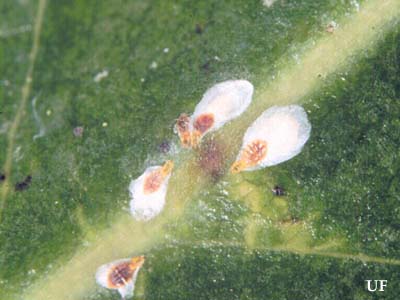
The magnolia white scale, Phenacaspis cockerelli, is also called false oleander scale. Image credit http://entomology.ifas.ufl.edu/creatures/orn/scales/false_oleander_scale.htm
Many fruit and ornamental shrubs and trees suffer from scale insects throughout the year. Most of the time home gardeners notice these insects in the spring or summer, because their exudate is the primary substrate for sooty mold growth. Although it seems counter-intuitive, the best time to control scale insects is in late winter. This can be achieved with one or two applications of horticultural oil, often called “dormant oil” in late January and early February.
Horticultural oil has been in use for well over one hundred years. While first only available in dormant oil formulations, it is now available in several types that allow for near year round application. Winter or “dormant” oils are heavier in weight, so they take longer to dissipate. Therefore, they cover pests for longer periods of time and are highly effective. All-season oils are purer, lighter and mixed with an emulsifier. This ensures that it will mix with water well and not damage the plant when exposed to warm, high-light conditions.
Horticultural oils are effective on soft-bodied insects and their eggs. Although scale insects often have a hard outer covering, they are considered soft-bodied. In addition to scale, mealybugs, aphids and spider mites are affected. These oils work primarily by smothering the insect and/or their eggs. Thus when oils are used, they block the insect’s ability to breathe.
Dormant oil is not a cure-all. It does not last very long, therefore the insect must be present for it to work. Additionally, it may kill beneficial insect eggs, so only use when a pest is present and do not apply to areas where infestations are not known. Make sure to cover the underside of the leaves and stems with spray.
Before applying dormant oils read the product label carefully. Any sensitive plants will be listed and temperature limitations will be noted.
Dormant oil is commonly used to control pests on these plants:
- Fruit trees in the Rosaceae (Pear, Apple, Peach, Plum, Nectarine, Blackberry)
- Roses
- Camellia (when not in bloom)
- Magnolia
- Gardenia
- Blueberry
- Crapemyrtle
- Dogwood
- Citrus
- Many others
For additional information, check out this EDIS publication Natural Products for Managing Landscape and Garden Pests in Florida.
- Woodland Pinkroot Adds Vibrant Color to Spring Landscapes - April 27, 2023
- Easy Care Roses for the Gulf South - April 20, 2023
- Herb Gardening: When Oregano is Flavorless - March 9, 2023
